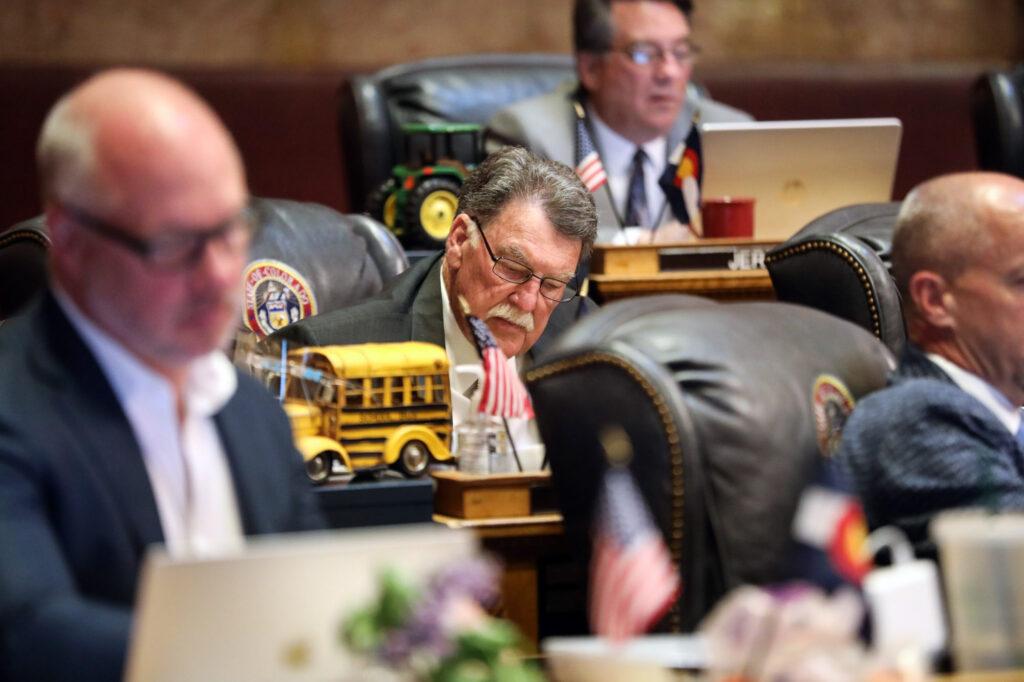
When Fruita resident Megan Beezley passed through airport security in North Carolina, she said she didn’t expect to be sexually assaulted.
TSA screening technology flagged something on the back of her dress, triggering a pat-down. According to Beezley, who is a trans woman, the officer put her hand between Beezley’s legs, up to her genitals.
In the aftermath, Beezley thought about knocking on her congresswoman’s door for help. She’d voted for Rep. Lauren Boebert in 2020, but after watching Boebert’s actions in office, Beezley didn’t have any hope that she would be willing to hear her story and take action.
“My representative isn’t interested in transgender anything,” Beezley said. “One of the avenues that as a citizen is supposed to be made available to me, was not. And it was specifically because of her beliefs.”
Beezley said Tuesday’s GOP contest in Congressional District 3 comes with particularly high stakes for her and other LGBTQ+ people on the Western Slope. The two candidates — Boebert and state Sen. Don Coram — have different track records when it comes to their concerns.
Just months after being sworn in last year, Boebert made headlines for an anti-trans floor speech in which she urged her colleagues to vote no on the Equality Act, a bill that would prohibit discrimination based on sex, sexual orientation or gender identity.
Beezley said it’s not just Boebert’s rhetoric about trans people, it’s also the legislation she’s brought forward.
After TSA announced new procedures for trans and non-binary passengers earlier this year, Boebert introduced a bill to prohibit the agency from implementing the new policy. Asked about Beezley’s allegations and Boebert’s bill, a TSA spokesperson said the agency can’t comment on specific situations or pending legislation, but that the agency reviews all complaints and continually improves its processes to ensure travelers are treated with respect.
In a press release announcing her bill, Boebert accused the TSA of prioritizing “woke transgender policy” over security.
“By mandating the TSA decrease pat-downs and identity validation standards for individuals identifying as transgender, the Biden administration is practically inviting terrorists to take advantage of our weak and woke security system,” the release said.
Beezley said she understands the importance of appropriate security — she served in the military for most of her career — but she doesn’t understand Boebert’s reasoning.
“For someone like Boebert to go: ‘Oh, it's a security risk.’ To who?” Beezley said. “I guarantee when you’re trans, you’re freaked out enough as it is traveling.”
Since assuming office in January last year, Boebert has also introduced two other anti-trans bills. One would recognize a cisgender swimmer as the winner of an NCAA Women’s Freestyle race, after she placed second behind a trans woman in the competition. The other would prevent federal money from funding research related to medical transition for minors. None have moved forward.

Boebert’s challenger has a different record
After more than a decade in the state legislature, Sen. Coram, the challenger taking on Boebert, has his own record on LQBTQ+ issues. In 2012, he cast the deciding vote to kill a civil unions bill, a move that caused a rift within his own family.
Mesa County lesbian activist Heidi Hess remembers that vote. But she said she’s seen his thinking and his policies shift since then.
“We don't always agree, and that's okay. But Don Coram listens,” Hess said. “I believe that in a representative government, the person who gets elected represents the entire district, whether you voted for them or not.”
In 2019, Coram voted yes on Jude’s Law, which allows Coloradoans to more easily change their gender on their birth certificates. That year, he also sponsored a bill on comprehensive sex education — it prohibits public schools that teach sex ed from excluding the experiences of the LGBTQ+ community from their curriculum.
While Hess said she can’t be sure how Coram would vote in Congress, she expects him to stay accountable to his constituents.
Neither the Boebert or Coram campaigns responded to a request for comment on their stances on LGBTQ+ issues.
Concerns over the consequences of rhetoric
Delta resident and trans man Xavier Saenz said this race could have significant consequences for LGBTQ+ youth in particular. He waited until he was 43 years old to transition, and he wants better for the next generation.
Saenz said that when Boebert and other elected representatives use anti-trans talking points, it normalizes transphobia, something that is more than hurtful — it can be dangerous. He added that he and his family have been called names and even had to create a safety plan before they attended a recent school board meeting.
“We've been told that we are ‘grooming,’ we're ‘perverts’ and whatnot,” Saenz said. “But I don't understand: If I'm so bad, Why do you all keep sending me your kids that you don't want? I have no biological children, but these LGBTQIA+ children are calling me dad because you're throwing them away.”
Bailey Carlson, a trans man from Durango, believes people may buy into Boebert’s talking points out of fear and misunderstanding. Often, he said, people who haven't met a trans person before only have this rhetoric to reference.
“We're not trying to get your kids to be gay, or queer or trans,” Carlson said. “We just want those kids that are queer, that are trans, to survive.”
Carlson voted in the Democratic primary. But given the district’s overall conservative lean, he said he’ll be watching the Republican contest with a close eye this Tuesday.
“I want LGBTQ people to feel safe, and people like Boebert are really pushing back what so many queer people died for and fought for,” Carlson said.“We can't let anyone take that away from us.”









